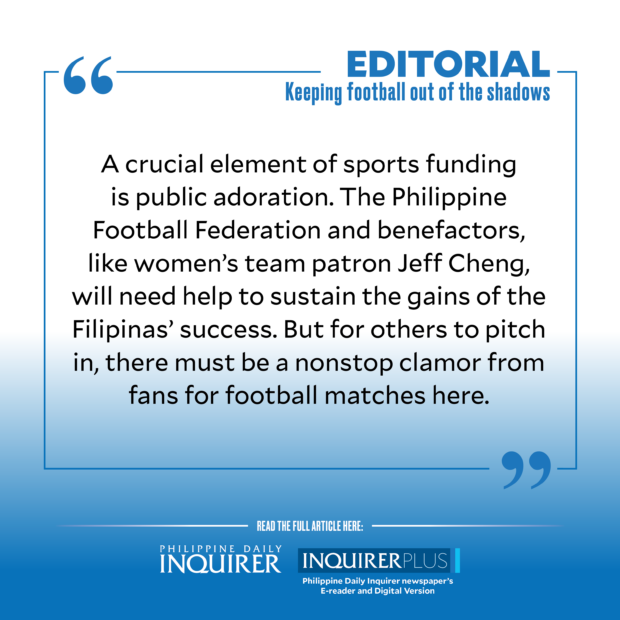Keeping football out of the shadows
Maybe it’s the lights.
As part of the $19 million poured into upgrading stadiums to be used for the Women’s World Cup in New Zealand, organizers installed new polarized floodlights—equipped with precise lighting control—aimed at providing brightness uniformity and better illumination not only for the live audience but for broadcast and livestream viewers as well.
For some reason, we can see the Filipinas clearly now. Like, HD clearly.
Fans at the venue and those watching on their television sets and mobile phones swear they could see tears roll down the cheeks of Hali Long, the ace defender and cocaptain of the Philippine women’s football team, every time she sings the national anthem.
There was no missing out, too, on Sarina Bolden rising above two defenders and then turning a Sara Eggesvik pass into a powerful header into a nation’s core memory.
That goal created the first tournament milestone for a team that has been breaking barriers since qualifying for the sport’s biggest event.
It was the first goal ever for the country in the World Cup—by a Filipino man or woman.
And Olivia McDaniel made it clear for everyone to see that when that lone goal came under desperate onslaught from the Kiwis, she was ready to save the day, thwarting a frustrated New Zealand side with some of the most incredible stops in the tournament.
Bolden’s goal, the result of a sequence initiated by Long’s free kick, and McDaniel’s sublime saves wrote the Philippines into World Cup lore—the team held on for a historic 1-0 victory, the country’s first in the event.
We watched the team explode in rapturous screams of joy, huddle in celebration, line up in front of the stands to acknowledge the fans, do post-match interviews, and take selfies to record the moment.
We also watched the significance of the moment sink in. In the country’s first appearance in the global showcase, it took two games for the lowly-rated Filipinas to earn that precious, and now famous, victory.
“When you hear stories of how it has taken other teams to win World Cup matches and to think that we’ve done it in only our second World Cup match in our first World Cup, it’s a special moment in the history of Philippine team sports,” said coach Alen Stajcic.
In the country, everyone celebrated, too, referring to the outcome as a dream result. A fairy tale.
But as with past moments of glory we had witnessed before, there is the inevitable question: Where do we go next?
The Filipinas elevated the sport into a precarious throne, one prone to attacks of indifference and forgetfulness.
Wasn’t it just over a decade ago when the Azkals, the men’s national squad, did the same thing and heralded what everyone called the renaissance of the sport? A professional league even emerged from the so-called “Miracle in Hanoi,” the title given to the unexpected victory of the men’s squad over Vietnam in a Southeast Asian tournament.
Where is the men’s program now?
The Filipinas’ victory was an even bigger moment. This is, after all, the World Cup.
What happens when the curtains fall on the tournament? The Asian Games beckon. After that? How does football proceed?
The Filipinas made it clear that they were fighting for flag and country not just in the sporting sense. They also wanted to create a pathway for young kids to take so they, too, can make their dreams come true.
About 17,000 kilometers from where the team notched its historic victory, a contingent of young footballers assembled by the Makati Football Club battled their hearts out in a youth tournament in Sweden against girls twice their size—and that’s not hyperbole.
“I believe that when you play, your size doesn’t matter as long as you always give your best,” nine-year-old Renzel Grace Gella told the Inquirer in a message typed in her native Ilonggo. But what happens when the cheers die down?
A crucial element of sports funding is public adoration. The Philippine Football Federation and benefactors, like women’s team patron Jeff Cheng, will need help to sustain the gains of the Filipinas’ success. But for others to pitch in, there must be a nonstop clamor from fans for football matches here.
For a stable football program to emerge, there must be a well-paved grassroots-to-professional highway. There must be sustainable leagues for young talents like Gella to aim for.
More importantly, we must fill stadiums or demand television coverage in events where the LED bulbs aren’t as modern.
Football can’t be an out-of-sight, out-of-mind sport.
The Filipinas won one match. The thing is, they want to keep winning at football. Bolden needs help from more than just Eggesvik or Long. McDaniel needs everyone else to save the day.
The sponsors that hopped on the bandwagon when the team qualified for the World Cup should loiter around a little longer.
That way, we all will have an answer to the pressing question that will linger long after the World Cup ends.
What happens when the floodlights are switched off?





















